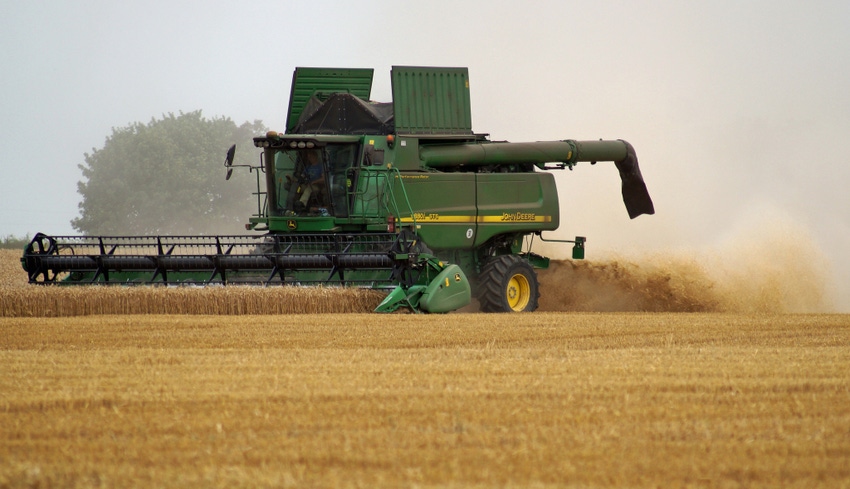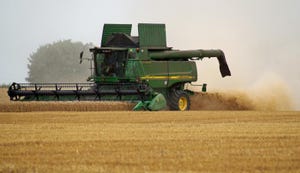4 things to remember during National Farm Safety & Health Week
September 23, 2015

National Farm Safety and Health Week is this week. The annual event runs Sept. 20-26, and it’s a good time to remember to slow down, put safety first, avoid unnecessary risks and keep your family intact. As harvest and fall cattle work begin, here are four things to remember to be safe on the ranch.
1. Stay diligent on the road.
Be aware of your surroundings, and remember it’s illegal to pass on the shoulder of the road. In a recent article for WKOW.com, Rob Richard, Wisconsin Farm Bureau senior director of government relations, says, “It's just being aware, don't be texting, don't be on the phone, maybe keep an eye out for things you normally wouldn't see or expect. Especially on those country roads where you have turns and hills and stuff like that. You go over a hill, you go around that turn, you may run into a combine that is 20 feet wide.”
2. Everyone could use a wake-up call once in a while.
Missouri Cattlemen’s Association Executive Vice President Mike Deering recently shared the story of the tragic death of his father. When Deering was 11 years old, his dad died in a tractor accident; one, he says, that could have been prevented.
“My dad made the risky decision to cross a muddy dam to hay cattle. He had other options, but chose to cross this narrow dam in April of 1993 when much of Northwest Missouri was experiencing serious flooding conditions—commonly and simply called the Flood of '93. He underestimated just how muddy the narrow dam was and lost control. The tractor tipped over and took him down with it, killing him instantly. My life was immediately changed. My best friend and mentor was gone. My sister and I had lost our father. My mother left without her soulmate. My child, which we are expecting to arrive in December, will never know this amazing man. Life changed.
“Why do I tell this story? It is not sympathy I seek. Believe me, it took me nearly a decade to muster enough courage to even talk about this. But now, I speak openly about it in hopes that one heartbreaking story can save lives. My goal is one less heartbreak. Sometimes people, including you, can benefit from a wakeup call. And believe me, there are several stories out there just like mine. According to data from the Bureau of Labor Statistics, farming and ranching is in the top 10 most dangerous professions in the country. More than likely, you know someone in your community who was injured or killed in a farm or ranch-related accident.”
READ: Avoid a sad story: Focus on safety

Photo Credit: Flicker user David Wright www.flickr.com/photos/dhwright
In telling his story, Deering says that many farm fatalities are preventable.
Deering writes, “Prevention starts with awareness. This means fully thinking through the situation rather than simply following a routine. This is much easier said than done—believe me. Along with being skilled at what we do, comes a routine—doing the same thing day after day, year after year—eventually having the ability to do the job blindfolded. Unfortunately, years of practice depletes the awareness. Getting caught in the routine is synonymous with getting caught off guard, which opens the door for deadly errors.
“All it takes to alter this pattern is making safety on the farm and ranch a core value. Look around and evaluate the potential hazards. If you have some blatant malfunction on your operation that you refuse to fix to save a buck or two—fix it, and a "make-do" repair won't do. As naive as it may sound, baling wire and duct tape won't fix everything. The possibility of farming and ranching ever being 100% safe is out of the question, but being aware of the dangers will allow you to avoid some costly consequences.
“I urge you to slow down if you can and think about ways you can ensure you are doing everything possible to prevent injuries and death. I know it is the last thing on our minds, but I encourage you, as you are reading this, to just reflect on your daily routine. Think about your operation and write down potential safety hazards and jot down some ideas on how to minimize those risks. Share the list with your family and work together to address these issues in the same way you work together to make a living off the land.”
4. Don’t forget electrical risks.
Kelly Matter for WMBF News writes, “Electrical equipment such as power lines near the end rows or around grain bins may get overlooked during busy times of year, such as harvest. The simple action of moving a portable grain auger from one bin to another can have tragic results if the individuals involved are not extremely careful. Farm operators and workers need to look out for overhead power lines and maintain a safe distance away from them.”
Do you make safety a priority on your operation? Have you had any close calls over the years? Share your thoughts in the comments section below.
The opinions of Amanda Radke are not necessarily those of beefmagazine.com or Penton Agriculture.
You might also like:
What's the best time to castrate calves? Vets agree the earlier the better
Seven keys to ranch profitability
Basics and benefits of fixed time-AI
13 new utility tractors for the ranch in 2015
You May Also Like



